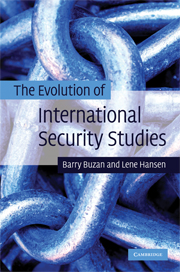Book contents
- Frontmatter
- Contents
- Foreword
- List of abbreviations
- List of figures
- List of tables
- Introduction
- 1 Defining International Security Studies
- 2 The key questions in International Security Studies: the state, politics and epistemology
- 3 The driving forces behind the evolution of International Security Studies
- 4 Strategic Studies, deterrence and the Cold War
- 5 The Cold War challenge to national security
- 6 International Security Studies post-Cold War: the traditionalists
- 7 Widening and deepening security
- 8 Responding to 9/11: a return to national security?
- 9 Conclusions
- References
- Author Index
- Subject Index
5 - The Cold War challenge to national security
Published online by Cambridge University Press: 05 June 2012
- Frontmatter
- Contents
- Foreword
- List of abbreviations
- List of figures
- List of tables
- Introduction
- 1 Defining International Security Studies
- 2 The key questions in International Security Studies: the state, politics and epistemology
- 3 The driving forces behind the evolution of International Security Studies
- 4 Strategic Studies, deterrence and the Cold War
- 5 The Cold War challenge to national security
- 6 International Security Studies post-Cold War: the traditionalists
- 7 Widening and deepening security
- 8 Responding to 9/11: a return to national security?
- 9 Conclusions
- References
- Author Index
- Subject Index
Summary
This chapter is devoted to those approaches which in various ways challenged Strategic Studies. These approaches had one thing in common – namely their criticism of Strategic Studies – but they also differed so much in their choices of key analytical and political concepts that it would be difficult to present them as one approach and to take this approach through one driving force after another. A significant challenge to Strategic Studies (although in part operating from within it and in part rooted in Peace Research) was Arms Control, which emphasised the collective risk to survival arising from the intersection of superpower rivalry and nuclear weapons. The Peace Research branch of Arms Control offered a very different, more normatively and politically driven, view of nuclear deterrence than Strategic Studies. But it was still, when viewed through the lens of the four questions that structure ISS laid out in chapter 1, an approach to security that focused on security's military dimensions and on external threats. The extent to which most Arms Control Peace Researchers envisaged bipolarity as a structure that could be eased but not eradicated, was striking. Détente – the political alternative to containment and deterrence – was seen as ‘rivalry with lower risks of war, not an end to rivalry’ itself (Buzan et al., 1990: 9; see also Pastusiak, 1977; Schlotter, 1983).
- Type
- Chapter
- Information
- The Evolution of International Security Studies , pp. 101 - 155Publisher: Cambridge University PressPrint publication year: 2009



